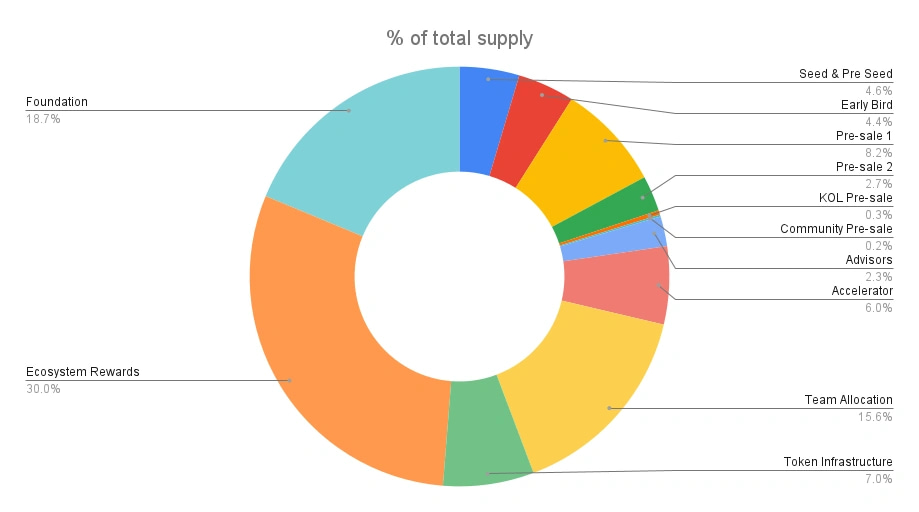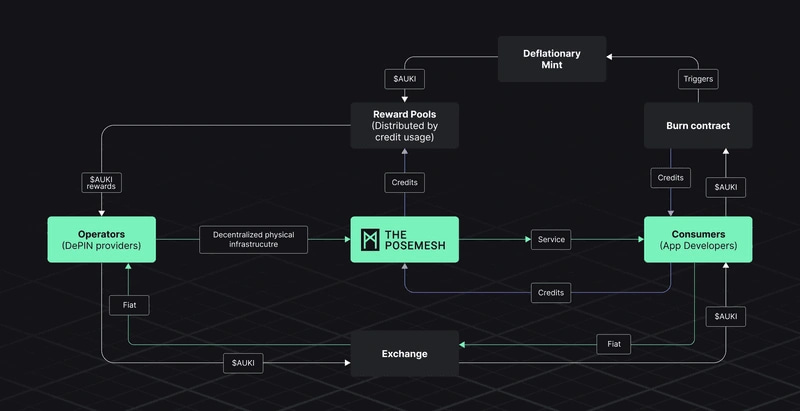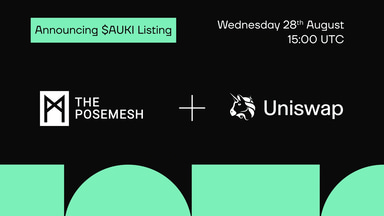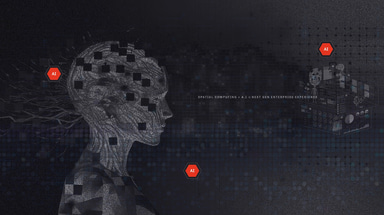Read
Edit
History
Notify
Share
AUKI Network
Auki Network is a decentralized machine perception network and collaborative spatial computing protocol designed to help machines and AI understand the physical world through shared spatial data and computing resources. [1]
Overview
Auki is a decentralized spatial computing protocol that allows digital devices, such as headsets, robots, and handhelds, to privately share spatial data and computing power within ad hoc, trustless clusters. These clusters function as distributed spatial computers, enabling devices to exchange resources like sensor data, processing power, and storage to optimize performance based on individual needs. Built as part of the DePIN model, Auki emphasizes energy efficiency, data privacy, and decentralized collaboration, supporting use cases ranging from real-time mapping to complex computational tasks in various physical environments.
The protocol includes a blockchain-based rewards and reputation system to facilitate secure and economically balanced participation. Devices earn rewards for providing services and pay fees when consuming them, with all interactions recorded to maintain trust and performance. Rather than creating a centralized digital twin of the world, Auki supports interoperability between smaller spatial domains, allowing localized data exchange without compromising user privacy. Its design aims to scale alongside the growth of spatial computing while resisting centralized data extraction, positioning Auki as a decentralized infrastructure for future commerce, logistics, and digital interaction applications. [2] YOUTUBE@VID
Auki Labs
Auki Labs is the organization building the Auki Network. The company develops the Auki network. The posemesh network offers a collaborative sense of space that enables machines and AI to better understand and navigate the physical world. The mission of Auki is to enhance civilization's intercognitive capacity—the ability to think, experience, and solve problems collectively with humans and AI. Auki aims to create technology that expands consciousness, reduces communication barriers, and fosters collaboration between individuals and machines. [1]
Posemesh
YOUTUBE@VID Posemesh is the technical term used for the Auki Network's infrastructure. It is a decentralized network and protocol for machine perception and spatial computing that enables devices to collaborate by sharing spatial data and computational resources. Devices use the Posemesh SDK to announce their capabilities and discover other compatible devices through a global discovery service. These devices form “domain clusters,” private groups secured with encryption keys, where participants collaborate to interpret and process 3D environments. Each domain cluster establishes a shared spatial framework—called a domain—divided into partitions with three information layers: semantic, topographic, and rendering. Devices can contribute data to or purchase access from these domains, depending on their needs.
An on-chain staked reputation system governs access and participation within Posemesh. Devices must stake their reputation to join clusters, perform tasks, or access spatial data, creating a trustless structure for collaboration. Services and data consumption require off-chain credits from burning the network’s native $AUKI tokens. This mechanism supports stable service pricing while allowing dynamic token price discovery. Rewards are distributed in $AUKI based on participants’ contributions, encouraging active involvement in supporting domain clusters and the broader protocol. [2] [3]
Discovery Service
The Posemesh discovery service functions as the network’s decentralized coordination layer, enabling participants to connect based on their capabilities, reputations, and access roles. It acts as the gateway to the blockchain, storing registered participant data, such as available services, staked reputation, and credit balances, in a distributed hash table (DHT) structured by geographic partitions. Participants use this service to identify and join relevant domain clusters by locating the domain manager, who then provides an authentication key for secure, private collaboration within that cluster. Crucially, the discovery service never has access to these internal encryption keys, preserving privacy and ensuring that communications remain confined within clusters.
By leveraging a decentralized hash table rather than a centralized registry, Posemesh reduces the risks of downtime and network failure due to single points of attack or disconnection. The discovery service also links blockchain functionality with the Posemesh network, facilitating on-chain verification, role assignment, and rewards distribution in a trustless manner. This structure ensures that interactions across the network are verifiable, decentralized, and resilient, forming the backbone for efficient coordination and economic settlement between devices. [4]
Domain Cluster
A domain cluster in the Posemesh is a secure, decentralized peer network formed by participants who wish to collaborate and exchange spatial data while preserving privacy. Each participant in the cluster maintains a replicated distributed hash table listing other members and their capabilities, allowing for mutual awareness and coordination. This structure enables the formation of autonomous peer networks without relying on centralized control, where participants can freely join or exit as long as critical functionality within the cluster is maintained. All communications are encrypted using shared keys unique to the domain cluster, ensuring that data exchanges remain private and isolated from the rest of the Posemesh network.
Within each domain cluster, one participant may assume the role of domain manager, responsible for storing and serving domain data and overseeing internal coordination. This manager facilitates local discovery and orchestrates data and task exchanges between participants but does not access or store the exchanged data itself. Its role is limited to enabling secure, private interactions between providers and consumers within the domain, ensuring a decentralized and trustless environment where sensitive spatial data can be shared without exposing it to external parties. [2] [9]
Domain Service
The Posemesh domain service addresses the challenges of spatial computing by allowing domain owners to host and provide digital representations of physical spaces to visiting devices. Unlike traditional cloud-based VPS solutions, which store large amounts of data in the cloud, the domain service enables self-hosted maps specific to a particular environment, reducing the need for devices to rely on centralized data storage. This decentralized approach ensures that the device only interacts with the relevant space and allows computation locally, minimizing privacy concerns. When computation is required, it can be handled by a participant in the domain cluster, preserving energy efficiency and privacy.
The domain Manager manages the Domain service, which stores and serves spatio-semantic representations of the environment while coordinating participant interactions. Both the Domain Manager and the Domain Owner earn rewards for providing spatial data to visiting devices, incentivizing their role in the network. Participants must stake reputations using the AUKI token, which helps ensure trust and accountability within the decentralized ecosystem. [5]
Relay Service
The Posemesh Relay service facilitates real-time collaborative spatial computing by providing a decentralized infrastructure for low-latency communication. Essential for use cases like shared augmented reality (AR) experiences and real-time games, the Relay service helps reduce latency to levels necessary for smooth experiences, such as achieving frame rates of 120Hz or more. Traditional Web2 cloud infrastructure struggles to meet these demands globally, but the Posemesh Relay uses spare compute and bandwidth from ubiquitous devices to create an international, decentralized substrate of servers. This infrastructure supports low-latency, hyperlocal networking, allowing devices to participate trustlessly and earn rewards.
The Relay service is designed to use unmetered internet and spare compute from millions of connected devices, making it capable of routing traffic efficiently and enabling faster peer communication. It is lightweight enough to run on IoT devices like routers or smart TVs, contributing to the network’s performance. Devices participating in the Relay service earn performance rewards based on their work and participation rewards from the protocol’s treasury, especially for nodes in strategically important areas. Operators must stake tokens to build a reputation and earn rewards, with the possibility of having their reputation slashed for failing to meet quality standards. [6]
Reconstruction Service
The Posemesh Reconstruction service is designed to process imagery and sensor data into detailed 3D representations of a space. When integrated into a domain cluster, reconstruction nodes handle compute-heavy tasks such as pose refinement, densification, spatial downsampling, and Gaussian reconstruction, which improve the quality and accuracy of the spatial data.
Pose refinement helps correct data inaccuracies caused by mobile device drift, allowing for better pose analysis. Densification enhances the dataset for more precise 3D reconstruction, while downsampling and Gaussian reconstruction improve navigation, spatial awareness, and scene rendering.
Reconstruction nodes earn performance rewards based on the amount of work they perform, such as refining or processing domain data. Participation rewards may also be issued to encourage the provisioning of Reconstruction nodes, ensuring they meet the needs of the Posemesh network. Operators must stake tokens to build their reputation and become eligible for tasks and rewards. The protocol can reduce their reputation if they fail to meet the required quality standards. [7]
AUKI
The AUKI token is the native utility token of the Auki Network. It is the backbone of the decentralized infrastructure powering the network and facilitates peer collaboration. The token has a deflationary design and is used for accessing services, staking reputation, and rewarding network participants.
Participants earn rewards in $AUKI for their contributions, such as providing spatial data or completing tasks. At the same time, service providers use the token to stake their reputation and gain access to network resources. The $AUKI token ensures that the Posemesh ecosystem remains functional, motivating individuals to engage in the network and maintain its integrity. [3]
Tokenomics

The AUKI token has a total supply of 10 billion tokens, distributed across various allocations:
- Ecosystem Rewards: 30.00% (3,000,000,000 tokens)
- Foundation: 18.74% (1,874,000,000 tokens)
- Team Allocation: 15.58% (1,558,000,000 tokens)
- Pre-sale 1: 8.18% (818,000,000 tokens)
- Token Infrastructure: 7.00% (700,000,000 tokens)
- Accelerator: 6.00% (600,000,000 tokens)
- Seed & Pre Seed: 4.60% (460,000,000 tokens)
- Early Bird: 4.38% (438,000,000 tokens)
- Pre-sale 2: 2.73% (273,000,000 tokens)
- Advisors: 2.30% (230,000,000 tokens)
- KOL Pre-sale: 0.34% (34,000,000 tokens)
- Community Pre-sale: 0.15% (15,000,000 tokens) [8]
Burn-Credit-Mint

The Posemesh network operates with a unique economic model called "Burn-Credit-Mint," designed to balance the supply of $AUKI tokens while promoting network growth and participant incentivization. The process begins with developers purchasing $AUKI tokens, which they send to a burn contract, and then they are removed from circulation. In return, the developers receive Posemesh network credits, which can be used to access services within the network.
These credits are the currency for Posemesh services, and their consumption encourages the active use of network resources. As credits are spent, a deflationary mint occurs, adding newly minted tokens to the reward pool. Resource providers who contribute to the network earn rewards from this pool, paid in $AUKI tokens. This cycle fosters a sustainable growth trajectory, encouraging participation while controlling the token supply. [10]
Partnerships
- Animoca Brands
- Maelstrom
- Outlier Ventures
- Faculty Capital
- Kenetic
- NGC Ventures
- Primal
- ARKN Ventures
- Pulsar Trading
- Shima Capital
- Tribe Capital
- Vespertine Capital
- Exnetwork Capital
- Baboon VC
- NuNet
- Silencio
- Mindful Ocean Metaverse
- Exabits
- CharacterX
- Nuklai
- Drip
AUKI Network
Feedback
Did you find this article interesting?
Twitter Timeline
Loading
Media







REFERENCES
[1]
[2]
[3]
[4]
[5]
[6]
[7]
[8]
[9]
[10]